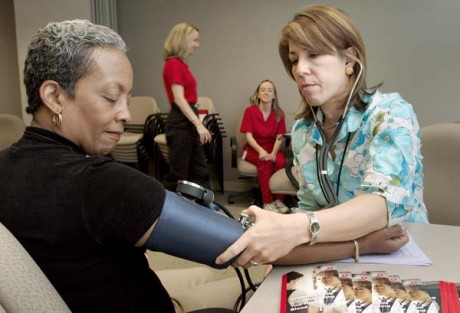Be someone’s stroke of luck
Learn how to identify and prevent strokes
When a car crashes, everything goes by in a flash — glass loudly breaking, metal bending, worlds turning upside down. Folks within earshot immediately dial 9-1-1 for help. Now imagine the same wreck occurring inside the mind of someone near you — a stroke. There are no screeching tires, no shattering glass. Who will call for help?
Sadly, fewer than one in five Americans recognize stoke symptoms. And up to 80 percent of strokes are preventable. Strokes represent the third leading cause of death and the leading cause of adult disability in America.
Risk factors
High blood pressure remains the number one cause of strokes. Have it checked regularly. For most adults, the Centers for Disease Control and Prevention advises normal blood pressure should be 120/80 (systolic/diastolic) millimeters of mercury (mmHg). High blood pressure consists of a systolic of 140 mmHg or more, or a diastolic of 90 mmHg or more.
Other controllable factors include cholesterol, transient ischemic attacks (mini-strokes), diabetes, smoking, alcohol consumption, obesity, and heart diseases such as a trial fibrillation.
Act quickly
A stroke, or "brain attack," occurs when blood and oxygen flowing to the brain is interrupted by a blood clot or a broken blood vessel. This kills brain cells in the immediate area, often causing disabilities including speech problems, memory loss and paralysis.
Recognizing stroke symptoms and immediately seeking emergency medical attention are critical. Emergency treatment with a clot-buster drug called t-PA can help minimize or completely eliminate disabilities, but the drug must be given within three hours of the onset of symptoms.
Spread hope
Recovery can be a lifelong journey but five, 10 or even 20 years post-stroke, many stroke survivors regain the use of limbs and reacquire skills they thought were lost forever.
N.C. ranks high for stroke deaths, disability
Stroke is a leading cause of death and disability in North Carolina, and the state ranks seventh highest for stroke death rates in the nation, according to the North Carolina Stroke Association. The coastal plain of North Carolina particularly (as well as the coastal plains of South Carolina and Georgia) is also in the nation's "Stroke Buckle," where death rate from stroke is at least twice as high as the national average.
The incidence of strokes is higher for American Indians and African Americans. Risk factors also include a diet high in fried foods, including fried fish. Stroke can occur at any age–more than one-third of all stroke hospitalizations in North Carolina occur in people younger than 65.
To learn more and to locate local caregiver resources, call the North Carolina Stroke Association at (336) 713-5052 or visit www.ncstroke.org. You can also call the National Stroke Association at 1-800-STROKES or visit www.stroke.org.
-
Share this story:


